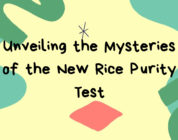Introduction: Navigating the Field of Purity Testing
Hey, ever stumbled upon the phrase “Rice Purity Test” and wondered, what on earth could that possibly mean? Well, you’re not alone! It’s a question that has intrigued many. “What is a Rice Purity Test and how does it work?” Stick around as we dive deep into the realms of this intriguing yet somewhat misunderstood concept.
What is a Rice Purity Test and how does it work?
The Rice Purity Test is a self-graded questionnaire that was originally designed to gauge the level of innocence, or “purity,” of a freshman entering Rice University. The test consists of 100 questions that touch on various aspects of life, including but not limited to crime, sex, drugs, and deceit. By tallying your ‘yes’ responses, you end up with a score between 0-100, which supposedly indicates your level of ‘purity.’ Interesting, isn’t it?
Origin and Evolution of the Rice Purity Test
Believe it or not, the Rice Purity Test started as a bonding activity for college students back in the 1980s. However, it wasn’t until the advent of the internet that it truly gained traction. Over time, the test has been modified and adapted to suit the evolving trends of society. Today, it’s seen as a fun and somewhat rebellious activity, particularly among young adults.
How is the Rice Purity Test Scored?
No rocket science here, folks. Each ‘no’ answer gives you a point, with the total score being the tally of these points. A higher score (closer to 100) indicates a higher level of purity. While a lower score suggests you’ve been a bit more adventurous or, shall we say, ‘impure’.
Understanding the Questions in the Rice Purity Test
There’s a broad range of questions in the Rice Purity Test, from the innocuous to the edgy. This part of the test isn’t for the faint-hearted!
The Innocent Side of the Test
These questions gauge your interaction with societal norms and how well you’ve stayed within the lines. Questions about school life, relationships, and family fall under this category.
The Spicy Side of the Test
Ready for a walk on the wild side? This side of the test dives into your experiences with sex, drugs, and law infringements. Quite the spicy meatball, huh?
Interpreting Your Rice Purity Test Score
Sure, you’ve taken the test, but what does your score really mean?
The High Scorers: Pure as the Driven Snow
Scoring between 98-100? Congratulations, you’re as pure as they come! This score typically implies that you’ve largely avoided the so-called vices of society.
The Middle Ground: Walking the Line
If you score anywhere from 70-97, you’re in the middle ground. It means you’ve had your share of life experiences but are still pretty cautious.
The Low Scorers: Been There, Done That
Scored below 70? It suggests that you’ve been quite adventurous and maybe pushed the societal norms a little. But hey, who are we to judge?
Why Take the Rice Purity Test?
Despite its origins, the Rice Purity Test isn’t just a ‘thing’ for college students anymore. It’s become something of a social phenomenon. But why do people take it?
For Fun and Curiosity
As humans, we’re naturally curious beings. The Rice Purity Test is a fun way to satisfy that curiosity about ourselves and others.
Bonding and Conversation Starter
It’s a great tool to break the ice during social gatherings. Your score might just be the topic of some interesting conversations!
Controversies Surrounding the Rice Purity Test
Like any popular trend, the Rice Purity Test has had its share of controversies.
Invasion of Privacy
Some view the test as intrusive, given the personal nature of some questions. However, remember that taking the test is entirely voluntary.
Promoting Unhealthy Behaviors
Critics argue that the test could potentially encourage risky behavior to achieve a lower score.
Rice Purity Test FAQs
Is the Rice Purity Test a psychological assessment?
No, the Rice Purity Test is not a psychological assessment. It’s a self-administered questionnaire meant for entertainment and shouldn’t be taken as an accurate representation of one’s personality or morality.
Is the Rice Purity Test anonymous?
Yes, the test is anonymous. Your answers are not recorded or shared with anyone.
Can the Rice Purity Test score change?
Absolutely! As we navigate through life, our experiences change, and so can our Rice Purity Test scores.
What is the average Rice Purity Test score?
While there’s no official statistic, the average score is often reported to be around 70-75.
Is a lower score on the Rice Purity Test bad?
Not at all! The Rice Purity Test is simply a gauge of life experiences. A lower score doesn’t denote anything negative about your character.
Who can take the Rice Purity Test?
Anyone can take the Rice Purity Test. However, it’s most popular among high school and college students.
Conclusion: Making Sense of the Rice Purity Test
While the Rice Purity Test may have started as a quirky college tradition, it has transformed into a popular social activity. In essence, it’s a personal inventory of your life experiences – the good, the bad, and the spicy. Remember, it’s all in good fun and shouldn’t be taken too seriously. So, why not give it a try and see where you land on the purity scale?




